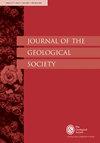Interaction of surface processes and crustal flow in the Eastern Himalayan Syntaxis
IF 3
3区 地球科学
Q2 GEOSCIENCES, MULTIDISCIPLINARY
引用次数: 0
Abstract
The syntaxes at the eastern and western ends of the Himalaya located at the Tsangpo and Indus gorge regions provide examples of the interplay between tectonics and erosion. A previous borehole study along the Yarlung River in the Eastern Himalayan Syntaxis (EHS) reveals a ∼1 km thick sedimentary wedge upstream of the Tsangpo gorge with a >2.5 Ma depositional age. However, mechanism of formation of this sedimentary wedge remains under debate. Here, we combine low-temperature thermochronology data and thermo-mechanical modelling to discuss how a sedimentary wedge formed at the highly eroded EHS. Our low-temperature thermochronology results show late Miocene fast cooling episodes focused at the Gyaca and Tsangpo gorges, which are interpreted to be related to coeval rifting at the former and rapid erosion and hot-crust upwelling at the latter. Constrained by the geological and geophysical observations, we apply thermo-mechanical models to illustrate the mechanism of formation of the sedimentary wedge and present high relief of the EHS. The numerical geodynamic model shows that localised erosion triggers middle ‘crust extrusion’ and regional topographic adjustment at the EHS. Thematic collection: This article is part of the Mesozoic and Cenozoic tectonics, landscape and climate change collection available at: https://www.lyellcollection.org/topic/collections/mesozoic-and-cenozoic-tectonics-landscape-and-climate-change Supplementary material: https://doi.org/10.6084/m9.figshare.c.7008098喜马拉雅山脉东段地表过程与地壳流动的相互作用
位于喜马拉雅山脉东西两端的藏布峡谷和印度河峡谷地区的综合体是构造与侵蚀相互作用的例证。之前在东喜马拉雅轴(EHS)雅鲁藏布江沿岸进行的钻孔研究显示,在藏布峡谷上游有一个厚达 1 千米的沉积楔,沉积年龄大于 2.5 兆年。然而,该沉积楔的形成机制仍存在争议。在此,我们结合低温热年代学数据和热力学模型,讨论了高度侵蚀的东高峰沉积楔是如何形成的。我们的低温热年代学结果显示,中新世晚期的快速冷却事件主要集中在加查峡谷和藏布峡谷,据解释,这与前者的共生断裂以及后者的快速侵蚀和热壳上涌有关。在地质和地球物理观测的限制下,我们应用热力学模型来说明沉积楔的形成机制,并展示了高海拔地区的地貌。数值地球动力学模型显示,局部侵蚀引发了中层 "地壳挤压 "和 EHS 的区域地形调整。 专题文集:本文是中生代和新生代构造、地貌和气候变化文集的一部分,可在以下网址查阅: https://www.lyellcollection.org/topic/collections/mesozoic-and-cenozoic-tectonics-landscape-and-climate-change 补充材料: https://doi.org/10.6084/m9.figshare.c.7008098
本文章由计算机程序翻译,如有差异,请以英文原文为准。
求助全文
约1分钟内获得全文
求助全文
来源期刊

Journal of the Geological Society
地学-地球科学综合
CiteScore
6.00
自引率
3.70%
发文量
68
审稿时长
6-12 weeks
期刊介绍:
Journal of the Geological Society (JGS) is owned and published by the Geological Society of London.
JGS publishes topical, high-quality recent research across the full range of Earth Sciences. Papers are interdisciplinary in nature and emphasize the development of an understanding of fundamental geological processes. Broad interest articles that refer to regional studies, but which extend beyond their geographical context are also welcomed.
Each year JGS presents the ‘JGS Early Career Award'' for papers published in the journal, which rewards the writing of well-written, exciting papers from early career geologists.
The journal publishes research and invited review articles, discussion papers and thematic sets.
 求助内容:
求助内容: 应助结果提醒方式:
应助结果提醒方式:


